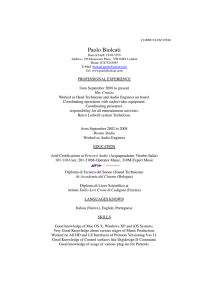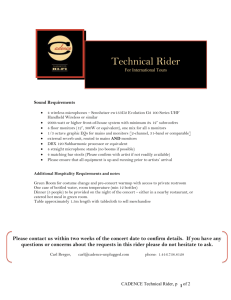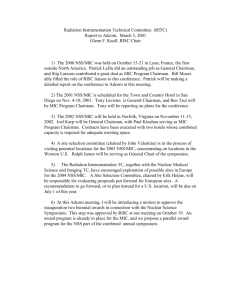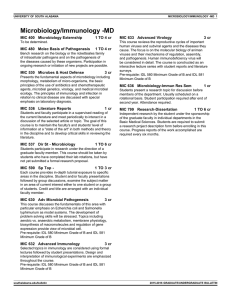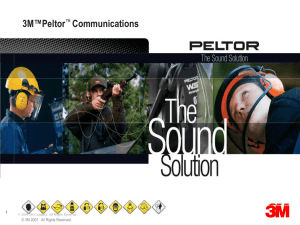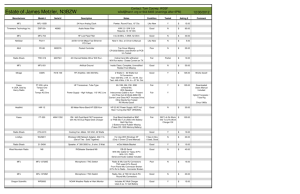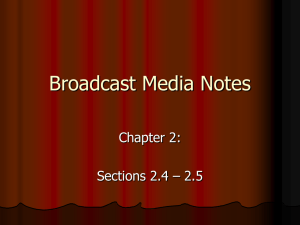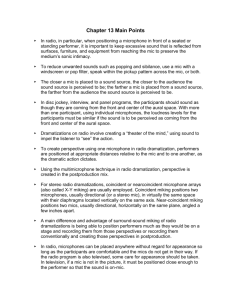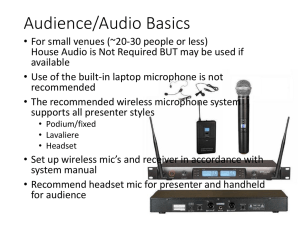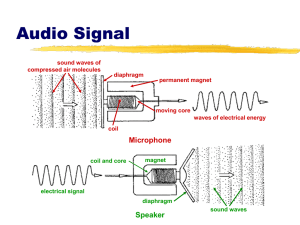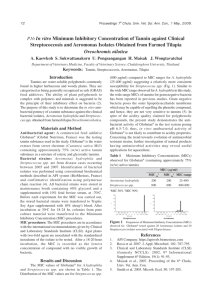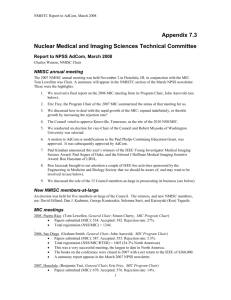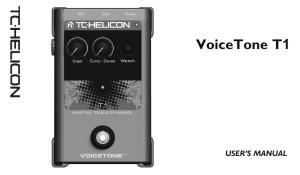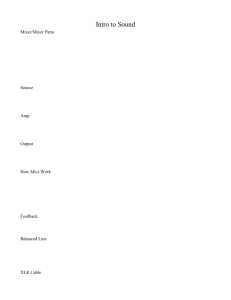Learning by Ear: Creating Sound - Bucks County Community College
advertisement
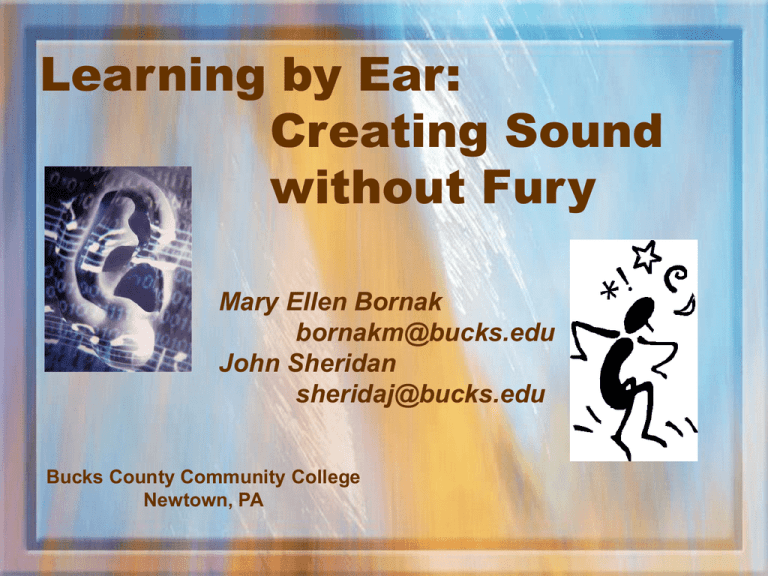
Learning by Ear: Creating Sound without Fury Mary Ellen Bornak bornakm@bucks.edu John Sheridan sheridaj@bucks.edu Bucks County Community College Newtown, PA Sounding Us Out John’s a jazz guitar Mary Ellen’s a beach Discussion Sound Bites: • • • • • • Sound and cognition Sound and learning Instructional design Digital sound Sound Production Sound Workstation Dual Cognitive Processing Multiple input Visual, auditory Multiple process Eye, ear Multiple paths Dual Process Learning Single Memory Process Visual working memory (Animation and text) Dual Memory Process Visual plus auditory memory (Animation, text, and sound) Result: Out-Performance Retention, recognition, transfer Audio Listening Skills Listening skills help students: • Identify main ideas • Recall details • Sequence events • Draw conclusions • Identify perspectives • Predict outcomes Auditory Stimulation • Transfers to reading skills • Results in more reflection • Utilizes familiar brain paths Captures imagination, drama, Audio Demonstrations Renowned speakers, leaders model: Oral clarity, style, coherence, expression, rhetorical devices, strategies Instructional Strategies Real life aspect News broadcasts, interviews Instruction Explain assignments Teacher presence Penn’s Prof. Bill Berner demonstrates expertise http://mediamogul.seas.upenn.edu:8080/ram gen/physics_lab/real/reflectionrefraction.rm Instructional Strategies • Memory Aid Rhythm and sound Photo, text and sound Language class Storytelling Effective teaching Experiential literature http://wiredforbooks.org/carol/ http://wiredforbooks.org/macbeth/ • Richness of web Culture, language Audio Teacher Presence Spinal Cord Protection By the vertebral column, meninges, cerebrospinal fluid, and vertebral ligaments. Adding Narration to Slides Merlot: Charles Ansorge LTA PowerPoint: Tutorials Portable Station Decisions High-end ProTools MBox Low-end FreeTools No XP version Windows Recorder IPod Audacity Considerations: Platform PC, Mac Web File format Capture Compression High-End Hardware Setup • • • • Computer MBox Condenser mic Low-impedence mic cable (2) Add-On Equipment Portable mic stand Gooseneck mic holder Headphones Mic Choice Key to Quality Sound Handheld mics, Imic and Lavelier Software Choices Sound recording ProTools Windows Recorder (free) Audacity (free) Sound editing ProTools Audacity (free) File conversion ProTools Jukebox (free) Free Recording Software Windows Sound Recorder Basic Mic, Free Recorder Mic basics: Quality Position Sound Recorder Hardware Ready to Record Laptop • MBox • Mic • Mic Stand • Cables • Headphones On Call: Our Portable Studio 1. Request 2. Script assured 3. In-office setup Script Is Ready…Now Start with clean sound environment Survey office noise Heater Air Conditioner Telephone Hallway noise Interruptions Prepare for the Worst Unexpected Noise Grass blowing outside the window Security guard’s squawking radio Bad Takes Don’t stand on the cables Plan for Retakes Checklist Reminders • Set headphone volume • Set mic level – Highest without clipping – Loudest passage • Record a take – Don’t rush • Affects quality • Talent performance • Playback – Check for clean signal • Do Multiple takes Working with Pro Tools Copy and paste Editing Fades (in, out, cross) Repair wave form Mixing Compression Reverb Effects, equalization Volume peaks Dialogue depth Mixing/Final Output in Pro Tools Automation – Mix – Mute – Effects Set Output Levels Final Mix Down Audio Mastering Data File format • AIFF, Wav, MP3 or real audio? Sampling rate • 44.1 kHz for CD quality Bit depth • 16-bit depth for CD quality Bounce to disk • • Mono Stereo From .wav to .mp3 Jukebox File Converter Interface Show Time: Walt’s Welcome Page Putting Heads Together To Take Home Ideas • • • • • • Share successful uses Ideas to cut costs Embed or stream? Equipment – high-end, low-end References and tutorials Any software/recommendations

